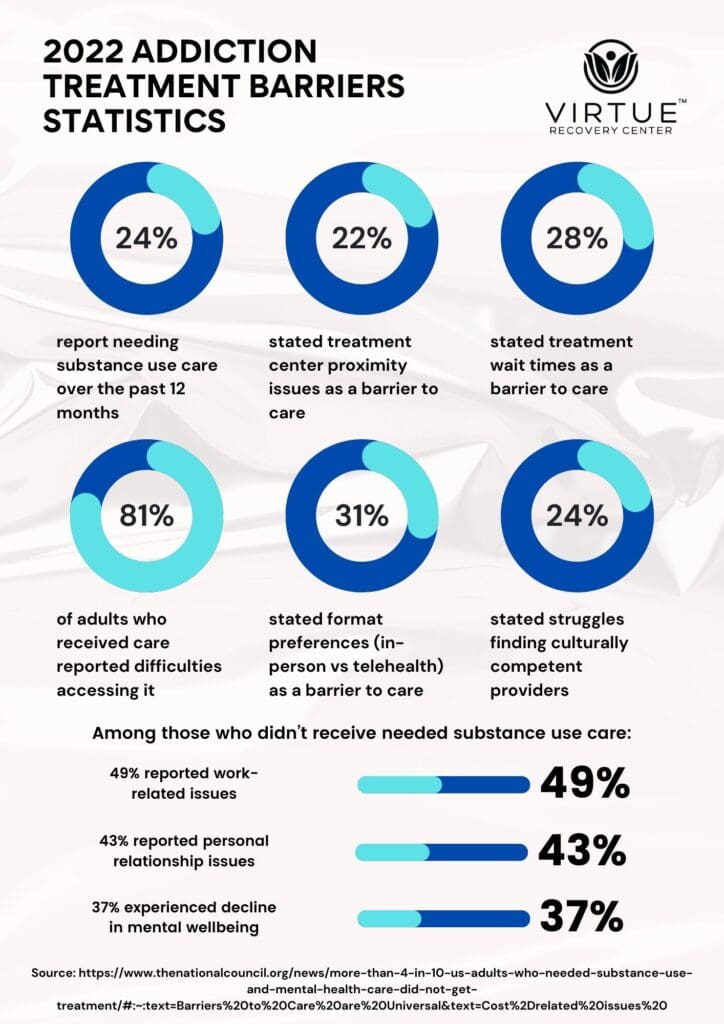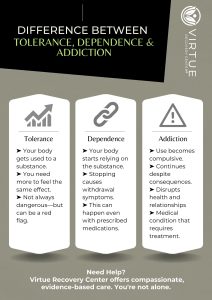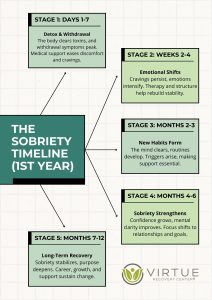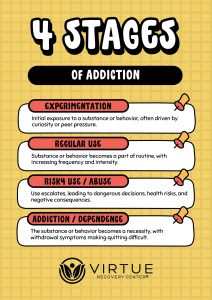Key Takeaways
- Cost, stigma, and proximity are significant barriers to addiction treatment.
- Overcoming these challenges improves recovery outcomes.
- Virtue Recovery Center helps clients navigate cost, travel, and cultural competency.
Introduction
Addiction treatment is a vital step toward recovery. Yet, for many individuals struggling with substance use disorders, accessing care remains a significant challenge. From financial obstacles to societal stigma, these barriers can delay or prevent life-saving interventions. This article delves into the common challenges in addiction treatment access and highlights solutions that can help overcome them.
Understanding the Need for Addiction Treatment
Addiction impacts millions across the United States. According to recent statistics, 24% of adults required substance use care in the past year, but many didn’t receive it. Similarly, 42% of adults reported needing mental health care.
Despite the demand, barriers like cost and accessibility prevent people from getting help. Addressing these obstacles is critical, as untreated addiction can lead to deteriorating health, damaged relationships, and lost lives.
Common Barriers to Addiction Treatment
Cost of Treatment
One of the most cited challenges in accessing addiction treatment is cost. About 31% of adults reported being unable to afford substance use care. Insurance coverage often falls short, leaving many to pay out-of-pocket.
Virtue Recovery Center understands that cost can be a significant barrier. They work closely with clients to develop financial plans, ensuring affordability without sacrificing the quality of care.
Proximity and Accessibility
Proximity to treatment facilities is another hurdle, especially for individuals in rural areas. About 22% of people cited difficulty finding nearby providers as a reason for not seeking care.
Virtue Recovery Center offers solutions for those who need to travel for treatment, assisting with logistics and ensuring clients can access the care they need.
Stigma Around Addiction
Stigma remains one of the biggest barriers to treatment. Fear of judgment or being labeled prevents many from seeking help. This stigma isn’t just societal; it exists in professional settings as well, deterring people from opening up about their struggles.
By fostering a compassionate and judgment-free environment, Virtue Recovery Center helps clients feel safe and supported in their recovery journey.
Long Wait Times and Availability
Wait times for treatment can also pose a significant challenge. In some cases, individuals are forced to wait weeks or even months for openings in programs. This delay can worsen addiction and discourage people from pursuing recovery.
Efforts to increase staff and expand services, such as those by Virtue Recovery Center, aim to reduce these delays and provide timely care.
Cultural Competency in Treatment
Cultural competency is essential for effective treatment. Unfortunately, many individuals report difficulty finding providers who understand their unique cultural or socioeconomic backgrounds.
Virtue Recovery Center prioritizes cultural competence in its programs. They offer tailored treatment approaches that respect and incorporate clients’ backgrounds and identities.
Breaking Down Barriers to Access
Overcoming the challenges in addiction treatment requires collective efforts from providers, policymakers, and communities.
Policy and Legislative Support
Initiatives like the Mental Health Access Improvement Act aim to expand the workforce and increase access to care. Certified Community Behavioral Health Clinics have also been successful in hiring additional staff to meet demand.
Integration of Care
Many individuals prefer receiving addiction treatment through their primary care providers. This integrated approach reduces stigma and makes care more accessible.
Telehealth and Flexible Options
Telehealth has emerged as a valuable tool in making treatment more accessible. Online consultations and virtual therapy sessions provide convenience, especially for those living far from treatment centers.
Community Education and Advocacy
Raising awareness about addiction and reducing stigma is crucial. Community programs that educate people about addiction’s realities can encourage more individuals to seek help.
Virtue Recovery Center: A Partner in Overcoming Barriers
Virtue Recovery Center stands out by addressing the key barriers to addiction treatment:
- Cost: Flexible financial plans ensure affordability.
- Proximity: Assistance with travel logistics for clients within a relatively large radius.
- Cultural Competency: Treatment programs tailored to diverse cultural and socioeconomic needs.
Their compassionate and holistic approach empowers individuals to take the first step toward recovery without fear or hesitation.

Conclusion
Accessing addiction treatment should never feel like an impossible task. By addressing barriers such as cost, proximity, stigma, and cultural competency, more individuals can find the help they need to reclaim their lives. Virtue Recovery Center is committed to breaking down these barriers and providing comprehensive care that respects each client’s unique journey.
If you or a loved one is ready to overcome addiction, call Virtue Recovery Center at 866-520-2861 today.
FAQs
What are the biggest barriers to accessing addiction treatment?
Cost, stigma, and lack of proximity to treatment facilities are significant challenges.
How does Virtue Recovery Center help with treatment access?
They assist with financial planning, travel logistics, and culturally competent care.
What role does stigma play in addiction treatment access?
Stigma prevents many from seeking help due to fear of judgment or discrimination.
Can telehealth improve addiction treatment access?
Yes, telehealth makes care more accessible, especially for those in remote areas.
Why is cultural competency important in addiction treatment?
Cultural competency ensures that treatment respects and incorporates individuals’ unique backgrounds and needs.
Does Virtue Recovery Las Vegas provide different approaches to addiction treatment?
Yes, Virtue Recovery Las Vegas offers a variety of evidence-based and holistic treatment approaches tailored to each individual’s needs, including therapy, medical detox, and specialized programs for co-occurring disorders.
Does Virtue Recovery offer payment plans to provide help for addiction and recovery treatment?
Yes, Virtue Recovery provides flexible payment options and works with various insurance providers to make addiction and recovery treatment accessible and affordable. In addition to flexible payment options, Virtue Recovery offers a range of evidence-based therapies to support individuals on their journey to recovery. One such treatment they provide is Vivitrol for opioid dependence treatment, which can help reduce cravings and prevent relapse. By combining medication-assisted treatment with therapy and counseling, Virtue Recovery ensures that clients receive comprehensive care tailored to their unique needs.
Resources
https://pmc.ncbi.nlm.nih.gov/articles/PMC9434658/
https://www.webmd.com/mental-health/addiction/substance-use-disorder-treatment-access
https://www.sciencedirect.com/science/article/pii/S2949875923002679












